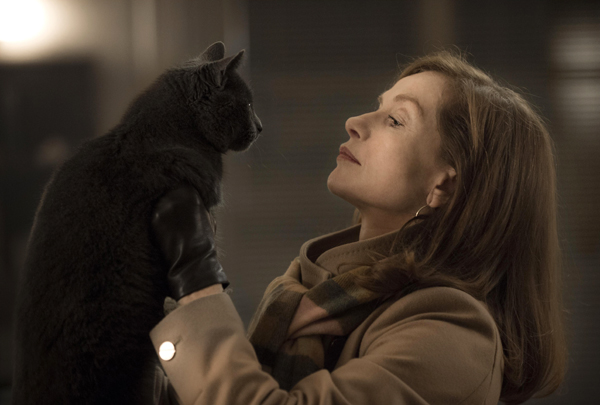Though rife with sexual violence and graphic dialogue, Paul Verhoeven’s blunt, button-pushing, and stinging comedy was the most elegantly made entry in the Cannes Film Festival’s competition. The closest to a star vehicle in the festival, Elle features a welcome addition to Isabelle Huppert’s resume of brittle, tough-minded, and multifaceted women.
Based on the 2012 novel Oh… by French-American novelist Philippe Djian, the simple title belies an amalgam of contradictory ideas. The off-kilter sensibility sets in immediately: In the opening shot, a masked man hits, pins down, and rapes a woman half his size, Michèle (Huppert), in the middle of the day. The film cuts to the camera’s point of view in the next shot, which belongs to the woman’s green-eyed, observant gray cat, Marty. Expect to hear among the audience uncomfortable laughter, and there are other moments when one often doesn’t know whether to grimace or guffaw.
After her assailant leaves through a living room window, Michèle cleans up the shattered knickknack that was smashed during the assault, picks up the phone and orders takeout, and takes a bubble bath. Noticeably, she doesn’t reach out to the police or to a hospital. The audience’s puzzlement deepens, and not only because of her stoic reaction. Her motivations, most of which are initially perplexing, become clearer, though sometimes off-putting.
Hardly an everywoman, Michèle lives in a large chateau outside of Paris—the spacious, minimally decorated rooms reverberate like echo chambers. At 50 years old, she thrives as a producer of rough-and-tumble video games. Except for her colleague and best friend, Anna (Anne Consigny), she works in a nearly all-male world where she contends with millennial egos and open hostility. (The pixelated creations in her Game of Thrones-esque productions are brawny men and scantily-clad women threatened with rape.) Besides the unknown identity of her assailant, the mystery surrounding Michèle widens as David Birke’s sharp adaptation layers one subplot on top of another, involving her friends and family, as well as the picture-perfect couple across the street. All of the relationships are succinctly well-drawn, hinting at deeper undercurrents.
Some critics have described the film as a tale of revenge, but that’s too general and simplistic. It’s less a female Death Wish and more of a head trip. Michèle’s motivations are, well, sticky. Far from passive and pensive, she reacts in ways that are mockingly cruel. No one course she takes is clear cut.
Actually, the casting of Huppert gives the movie some clarity, as the role is aligned with the actress’s repertoire of intelligent and abrasive enigmas. Michèle is kin to one of her most famous roles, in Michael Haneke’s The Piano Teacher. In both movies, the psychology of the trenchant and transgressive character has roots firmly set in the past, and centered on a parent; in Elle, it’s Michèle’s devoutly Catholic, infamous jailbird father. While his bloody, crime-ridden backstory pales in comparison to the other swirling subplots competing for screen time, it does provide motivation for his daughter. Though she eschews religion, Michèle seeks her own brand of punishment for her father’s multitudinous sins, and in this way she’s so much like Huppert’s other fearlessly self-punishing personas, including in 2009’s White Material.
Additionally, this may be Huppert’s most subtle performance in a long time—watch out for her graceful double-take. This viewer has frequently complained that the actress’s films too often lack humor and that it’s shocking to see her smile. Well, she more than makes up for that here. The viewers will pity anyone who is the object of Michèle’s mercilessly droll barbs as she dismisses the observations of her high-living mother or her feckless young son, Vincent (Jonas Bloquet), who hasn’t taken the same career path as her and her novelist/ex-husband. He works in a fast-food franchise and lives with his pregnant girlfriend, whom Michèle openly despises. Too often directors have over-relied on a close-up of Huppert’s steely visage, with her eyes swelling and, as if on cue, teardrops cascading down her cheeks. Verhoeven doesn’t resort to such shorthand.
Everyone here is well cast, including Charles Berling and Laurent Lafitte, who doubled as this year’s master of ceremonies at the festival. (Presiding over the opening night film, Woody Allen’s Café Society, he awkwardly joked to Allen that “You’ve shot so many of your films here in Europe, and yet in the U.S., you haven’t even been convicted of rape,” also referring to another filmmaker, Roman Polanski). With such nimble performances, Elle is closer to a drawing room comedy than a shocker, and it makes you wonder what Huppert would do with dialogue by the likes of Noël Coward. Forget the sex and violence, the film’s highlight is a Christmas dinner scene in which host Michèle takes no prisoners. It’s one of the most calamitous Christmases on film.
Compared to Verhoeven’s Basic Instinct, Showgirls, and Black Book, this is a stripped-down provocation, with a better script and no storyline shortcuts. Its attitude is no-nonsense and cocky, and the violence, though used for shock value, is not gratuitous. Lending a Hollywood sheen to the sordidness, the cinematography, art direction, and costume design are tasteful and richly-detailed. All contribute toward making what may be the director’s most entertaining and consistently well-made movie.







Leave A Comment